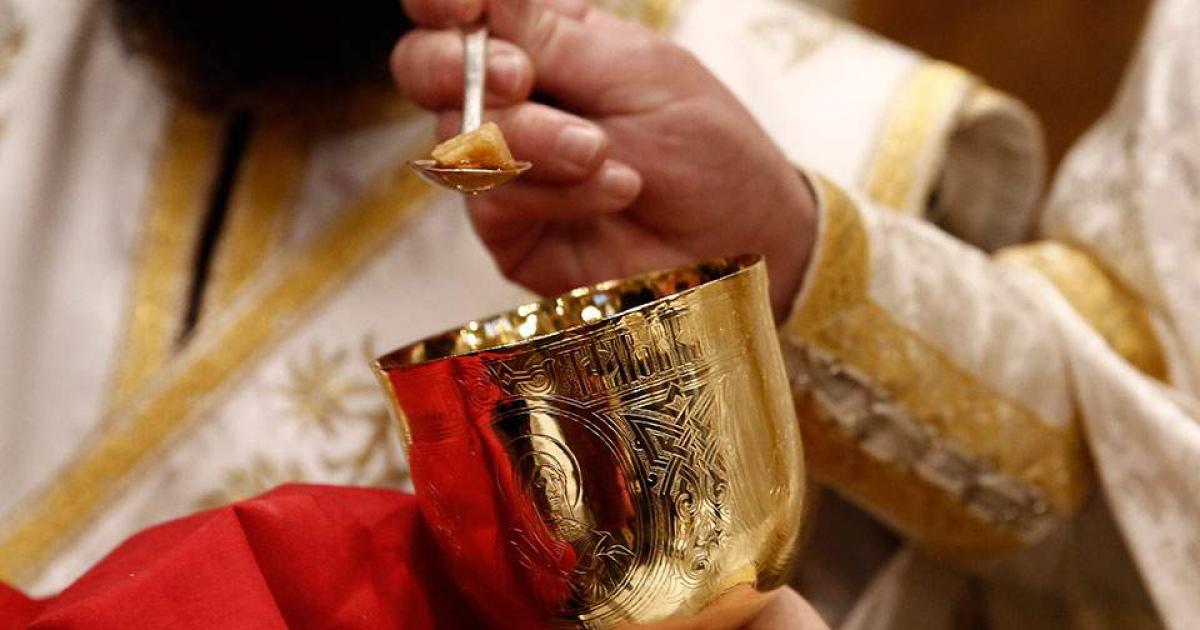
The establishment of the Great Mystery of the Divine Eucharist is the fruit of the complete and perfect love of our Lord Jesus Christ towards His Apostles (who would continue His work), and all those throughout the ages who would believe in the Gospel and be baptized.
On many occasions, the Lord expressed His sacrificial love towards His Disciples, both in word and deed. Let us recall some of these words of our Lord, which were said with great tenderness to his Disciples on Holy Thursday: “As the Father has loved me, so have I loved you...Greater love has no one than this: to lay down one’s life for one’s friends“ (John 15:9,13). It is here that the Lord expressed what He Himself would do shortly after on Calvary. Addressing His Father, Jesus prays: "Father, You are united with Me and I am with You; my desire is for all who will believe in Me ... to be united with Us" (see John 17:21). "Father, I desire that they also whom You gave Me may be with Me where I am" (verse 24).
These events and words (among many others, both before and after His return to His heavenly glory) reveal the ardent desire of the God-man Jesus Christ to continue His constant communion with His Apostles, along with those who would come after, believing and becoming members of His Church while on earth. He wished for not only this, but something even greater: to be in absolute and perfect union with them.
All of this seems contradictory and defies human reason. How can this possibly happen? We know from the Holy Gospels that Jesus, 40 days after His Resurrection, ascended from earth to Heaven, returning to His eternal glory, as we confess in the Creed: “He ascended into heaven and is seated at the right hand of the Father; And He will come again with glory to judge the living and dead.” How then can we, the members of the Church militant who live here on earth, be where our glorious Lord Jesus Christ is? Although our minds are unable to comprehend this great matter, our Lord and Almighty God, to Whom nothing is impossible, found the perfect solution by giving us the Mystery of the Eucharist.
Already, long before the Last Supper, the Lord began to prepare the hearts of His Disciples for the blessings of Communing His Holy Body and Blood. After the miracle of the feeding of the five thousand, the Lord took the opportunity to emphasize to His hearers the importance of spiritual nutrition, "Do not work for food that spoils, but for food that endures to eternal life, which the Son of Man will give you.” (John 6:27). And when the hearers asked Jesus, "Lord, always give us this bread” (verse 34), the Lord did not hesitate to reveal to them clearly: "I am the bread of life" (verse 35). He went further, telling them that their “ancestors ate the manna in the wilderness, yet they died. But here is the bread that comes down from heaven, which anyone may eat and not die.” (John 6: 49-50). He immediately reveals the truth to them: ”I am the living bread that came down from heaven. Whoever eats this bread will live forever. This bread is My flesh, which I will give for the life of the world.” (verse 51).
Here we see Jesus preparing His Disciples for what He would begin to do, from the Last Supper onwards, in His Church.
But, as the Evangelist John informs us later, the Jews did not receive this well. They were bewildered, and asked each other, "How can this man give us His flesh to eat?" (verse 52). These words were a scandal to them, and they left Him in protest, declaring that "This is a hard saying; who can understand it?” (verse 60). The Lord was not concerned with this reaction, but instead became more clear and direct with these words: ------- “Most assuredly, I say to you, unless you eat the flesh of the Son of Man and drink His blood, you have no life in you. Whoever eats My flesh and drinks My blood has eternal life.” (verses 53-54). Those who believed in His words would come to a fuller knowledge of the Mystery, which would come to them at the right time. What this means for us, is that the Holy Body and Blood of Christ which the faithful receive during the Divine Liturgy, unites them with Christ.
So our Lord Jesus Christ, with the Mystery of the Eucharist (served during every Divine Liturgy), manifests His most inward desire to be eternally united with every faithful believer.
How this happens is the subject of our next homily.





